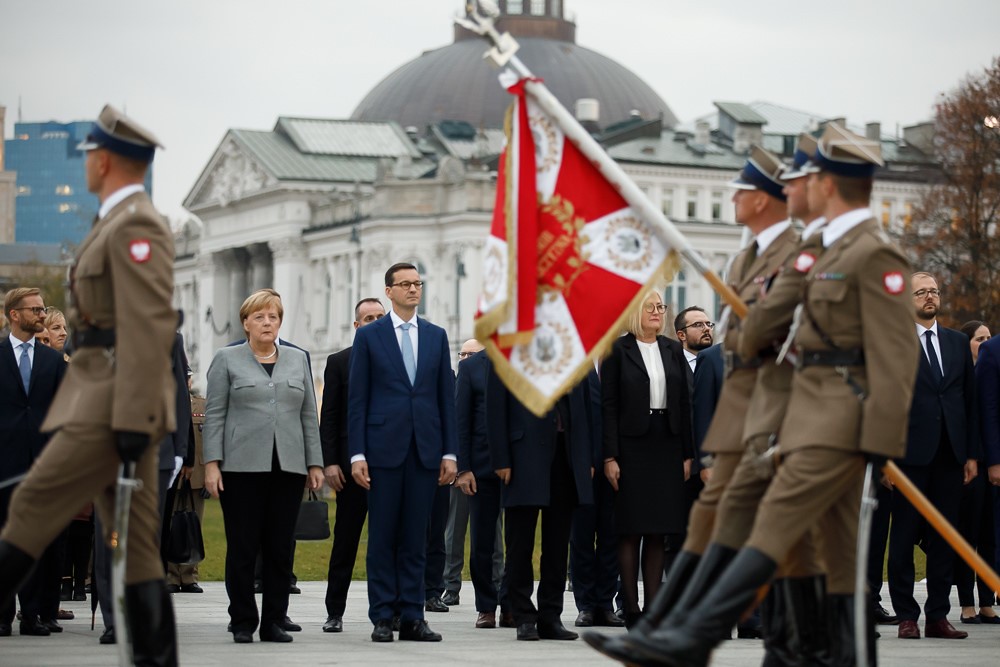The spokesman for Poland’s security services has accused Germany of carrying out “coherent and systematic information activities” designed to evade responsibility for the atrocities of the Second World War.
In an interview with news website Defence24, Stanisław Żaryn discussed Germany alongside Russia and China as examples of countries using various tools to carry out “coordinated information measures”.
But while Germany’s efforts are confined to historical politics, says Żaryn, the biggest threat to Poland comes from propaganda and information campaigns by Russia.
"Od lat Niemcy starają się wynaradawiać zbrodnie #WWII. Widzimy syst. zabiegi, które mają zbudować przekonanie, że to nie Niemcy, ale wynarodowieni "Naziści" zaczęli wojnę, zaatakowali PL, mordowali Polaków, dokonali Holokaustu".
Więcej na @CyberDefence24 https://t.co/n3LKkV6dWb
— Stanisław Żaryn (@StZaryn) November 15, 2020
According to Żaryn, Germany has “for many years” been engaged in a “coherent and systematic” campaign attempting to “denationalise the crimes from the time of the Second World War”.
“Analysis of messages from the German side shows a systematic approach…to remove from the contemporary German state the odium for what happened in the Second World War,” he added.
Berlin wants to “build the belief that it was not the Germans, but some denationalised ‘Nazis’ who started the war, attacked Poland, murdered Poles, and carried out the Holocaust”, explained Żaryn.
Some in Poland complain that the actions of the Third Reich are widely referred to as “Nazi” rather than “German”. They argue that this blurs responsibility for crimes, and can even lead to Poles being wrongly blamed for them, such as through use of terms like “Polish death camps”.
Speaking at the former Auschwitz-Birkenau camp on Holocaust Remembrance Day last year, Poland’s prime minister, Mateusz Morawiecki, emphasised that “this extermination was not carried out by Nazis; it was carried out by Hitlerite Germany. All this evil came from that state. This cannot be forgotten because otherwise there is a relativisation of evil.”
But the “greatest threat” to Poland, according to Żaryn, comes from Moscow, which uses disinformation and propaganda measures in tandem with other intelligence, military and energy-related tactics to increase its influence in the region.
“Russia is carrying out activities based on lies, manipulating the image of Poland, NATO, the West, deliberately and cynically lying to achieve its goals while harming us. Lies have become Russia’s way of influencing other states,” he said.
As “the most important country in Eastern Europe” and the largest on NATO’s eastern flank, Poland is particularly threatened, said Żaryn. The Kremlin is mounting “coordinated information measures” using “multilingual communications channels” to “blacken, undermine and weaken Poland’s image in the international arena”.
“Russia wants to show Poland as a country that is constantly causing problems in Europe…a certain threat for the stability and functioning of the EU and which through its Russophobic policy can lead to an enormous tragedy in international politics.”
The Russian federation also hopes to “build tensions” between Poles and the Americans stationed in Poland to show that US forces are a threat to Poles, he said. It is also active in propaganda to resist Polish attempts to become independent of Russian energy.
The Kremlin’s disinformation campaigns also respond ad hoc to the current situation, Żaryn argued, and the coronavirus pandemic has presented an “ideal situation to stir up anxieties, spread information chaos, and increase the emotions of the political dispute”.
At the start of this year, Warsaw became embroiled in a diplomatic dispute with Moscow over a series of assertions by Vladimir Putin and other senior Russian officials that sought to present Poland as being responsible for causing World War Two.
The spat resulted in Polish president Andrzej Duda boycotting a Holocaust forum in Israel (the organisers of which later apologised after facing criticism for legitimising Russia’s narrative of the war).
The European Commission also condemned “false claims” by Russia that sought to “paint the victims, like Poland, as perpetrators”.
Main image credit: Krystian Maj/KPRM (under public domain)

Ben Koschalka is a translator, lecturer, and senior editor at Notes from Poland. Originally from Britain, he has lived in Kraków since 2005.




















